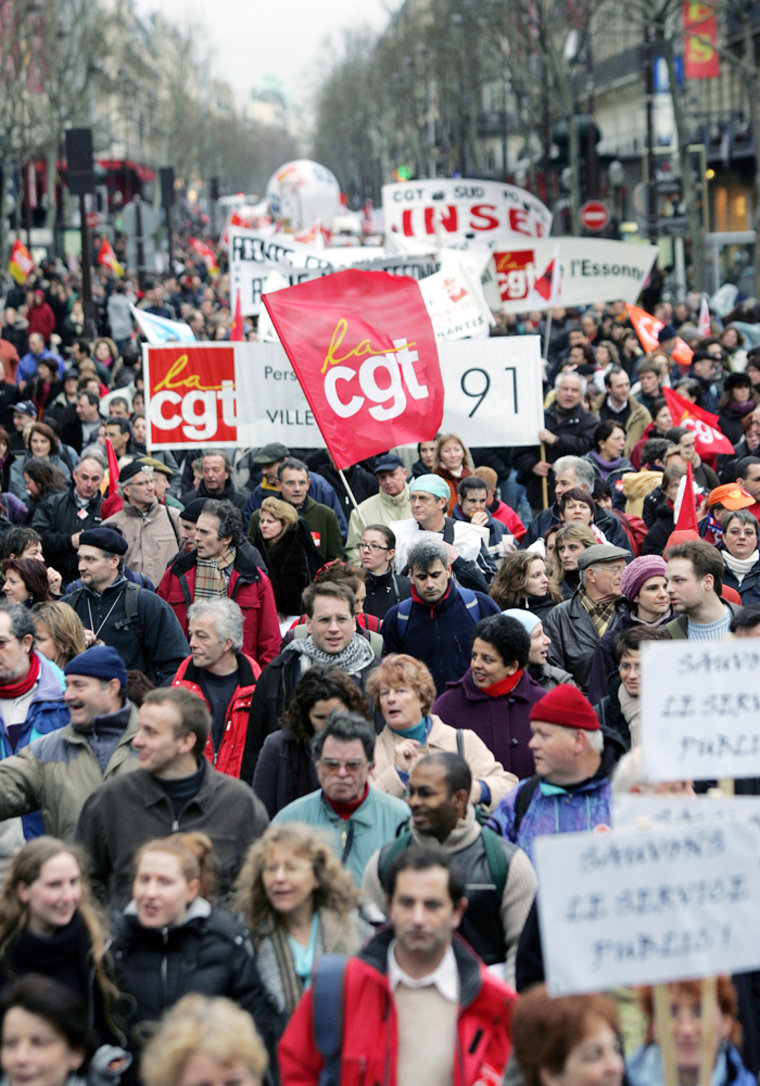More than 200,000 public sector workers marched through French cities on Thursday in widening protests over pay, reforms and job cuts that have sent a sharp warning to President Jacques Chirac’s conservative government.
On the third day of protests, some schools closed because of a one-day strike by teachers, and a stoppage by air traffic controllers grounded flights at Bordeaux in western France.
The protests followed a warning strike by rail workers that severely disrupted rail traffic across France on Wednesday and protests by energy and postal workers earlier this week.
Unions said 50,000 had joined a protest march that snaked noisily through Paris, though police put the number at 20,000.
‘They're killing the public services’
“I’m protesting against the quasi-reforms the government is carrying out. They’re killing the public services. It has to stop. Soon there’ll be nothing left,” said Lionel Reinisch, 35, a civil servant from the Paris suburb of Creteil.
Nationally, police said some 210,000 had taken part in protests, more than the 203,700 claimed by the CGT union.
Elisabeth David, head of the Unsa trade union that represents public sector workers, hailed the turnout: “This day is a success that has gone beyond our expectations.”
The government has vowed to press on with economic reforms. But it fears a failure to address the strikers’ concerns could prompt voters to punish it by opposing the European Union constitution in a referendum expected before July.
Chirac showed his concern by urging deputies from his ruling conservative party on Wednesday to make sure the referendum does not turn into a vote on domestic policies.
The strikes, provoked by discontent on issues that vary from sector to sector, have increased pressure on Prime Minister Jean-Pierre Raffarin.
He has played down any parallels with street protests that are widely seen as causing the downfall of the last conservative government in 1997, and took a tough line in comments to reporters.
‘An element of social dialogue’
“The strike is an element of social dialogue. What is not acceptable is when the strike becomes a blockage,” he said. “Anyone responsible for the breakdown of dialogue must expect to be treated with the necessary firmness.”
France’s economy, the second biggest in the euro zone, has hit a soft patch but the government is aiming for 2.5 percent growth in 2005 and aims to cut unemployment this year from 9.9 percent to about 9.0 percent.
Many workers are demanding pay rises which the government can ill afford to meet as it tries to limit public spending and keep the budget deficit to within limits set by the European Union.
Some workers oppose reforms and many reject planned changes to the law governing the 35-hour work week, which the government says will make it more flexible and make French industry more competitive.
Many ordinary people simply feel their purchasing power has receded because pay rises have not kept pace with inflation.
“Many average employees who yesterday seemed to be in a stable and even enviable situation ... no longer have that,” said Francois Bayrou, head of the centre-right UDF party.
He said France faced a “very deep social malaise.”
